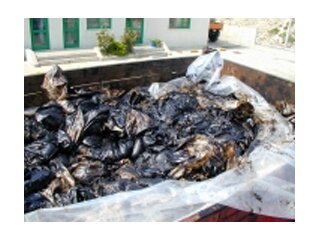Recovery of sunken oil in the Sea of Marmara (2002)
22 May 2014

Paper presented at IMO 3rd R&D Forum, 11-13 March 2002, Brest, France
During a storm on 29 December 1999 the Russian tanker VOLGONEFT 248 broke in two in the Sea of Marmara, off Istanbul, Turkey and spilled 1,578 tonnes of Heavy Fuel Oil. Most of the oil was cast ashore, and was subsequently cleaned up manually, whilst the remaining oil sank in shallow water. The sunken oil caused re-contamination of cleaned shorelines during storms and a decision was therefore taken to try and recover oil from the seabed.
A contractor was appointed and work started in April 2001. Manual oil recovery by divers was used in preference to dredging so as to minimise damage to the seabed. About 10 divers worked in depths of 1-15 metres and collected 150 tonnes of oil-contaminated sand per month. Roughly one quarter of the collected waste was pure oil. The oil content was determined by sampling the collected oily waste and measuring its calorific value. The oil content could then be calculated by reference to the known calorific value of the oil cargo. All collected oily waste was transported by road to a municipal disposal site for incineration.
A novel method is described for using a "no cure - no pay" contract to manage the recovery operation. The contractor was paid an agreed rate for the amount of pure oil collected. This approach proved successful and resulted in maximising the recovery of sunken oil whilst discouraging the collection of material other than oil. The commercial incentive created in this type of contract can also help to resolve the problem of determining the appropriate cut-off for the collection of widely scattered pockets of the sunken oil.
Category: Papers
